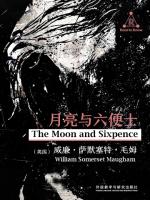The book review of The Moon and Sixpence
Colden
When I first read the book The Moon and Sixpence,the maxim “It
was sixpence all over the floor, but he looked up and saw the moon”
printed on the front page seems barely comprehensible to me.But when I
read over,I truly understand why life and art,the metaphor of moon and
sixpence,can never coexist at that time.The novel deeply discussed the
contradiction and interaction of life and art which is still of guiding
significance today and it seems exactly to be a kind of magic that
fascinates me. The novel is created by W.S.Maugham,a renowned
English novelist and dramatist.He was born in Paris on January 25, 1874
and had a pathetic childhood.Under the age of ten,his parents passed
away successively so he had to live with uncle.Because of short stature
and sever stuttering,he was frequently tortured and bullied by
others,which cast a shadow of pain on his tender heart.The lonely
childhood cultivated his withdrawn, sensitive and introverted character
but made him sympathetic and undaunted in the same time. As he grew
up,he wrote multiple novels all of which were significantly influenced
by his experiences in youth for they revealed a profound analysis of
life,art and belief.This novel is then one of those works. The
hero of this novel,Strickland,takes the French impressionist painter
Paul Gauguin as prototype and the whole story tells about how he
ultimately succeeded in pursuit of art.But its plot is not so much
fascinating to me as Strickland's unique traits.Strickland was a
stockbroker working in London with a satisfactory marriage and affluent
family.From a normal point of view,he should be satisfied with the
happiness despite the tranquility and monotony of life.However,he ran
away from home and headed for Paris without even a farewell in the
seventeenth year after marriage.When all of the rumors guessed he
abandoned his career and family because of an affair,people found out
that it's just his fanaticism for drawing. He had no basis for
painting and it was purely enthusiasm that drove him to do it.In fact,he
could paint nothing but destroyed the things that should have been
normal.So it was no surprise that he was reduced to poverty soon and
almost died of hunger and disease.People all believed he must be insane
except his friend,Stroeve.On the contrary,he saw through clearly the
gift in him and regarded him as a genius.To tell the truth,this part of
story has stuck in mind for a long time.On the one hand,I was moved by
Stroeve's tolerance and cordiality and indignant about his subservience
and cowardice.He was so considerate and warm-hearted that he gave his
francs,studio and almost everything he had to help him.He even
ridiculously gave away his wife!But unfortunately he lost everything at
last.On the other hand,I was astound and outraged by Strickland's
callousness,aloofness and effrontery.He was such a nuisance and bastard
that he was not only ungrateful and uncouth to those who helped him out
but took it for granted and despisesd them in his heart.So it's pleasant
to see that he was as poor again as a church mouse. He kept
leading a vagrae life and finally drifted to Tahiti where he married an
Aboriginal girl,Ata,with whom he lived a tranquil life as he wished.He
was isolated from the world without care but only fanatically pursued
the art of painting.Unfortunately he soon became infected with leprosy
and before his death he strained every nerve to finish his last work,a
giant mural.With his room full of murals burnt according to the last
words,his legendary life was ended.When I finish the book,my attitude
towards Strickland has changed a lot.I now admire his frankness of
speaking,his pretendiousness regardless of gossip and his dogged pursuit
of art. To some extent,he is a abominable person whose words and
behaviors run counter to social convention:he abandoned his wife and
seduced his friend's wife,he was reprimanded by others but can always
find proper excuses.Who can stop hating him when they primarily know
about his ruthlessness and effrontery?But that's exactly what attracts
me afterwards.He is such a person who would rather throw away dignity
than dreams and he was not afraid to break the barriers
single-handedly.However,in this fast-paced age,few people really follow
their inner voices to strive for dreams but are keen to pursue fame and
fortune.We all acknowledge that dreams weigh far more against changeless
and monotonous life like the saying goes"Life is not just about
survival, but poetry and distance" but we still can't break the
shackles of social rituals and live for ourselves as Strickland did.From
this point of view,he had set a good example for us. Some people
may argue that the irresponsible pursuit of dream fly in the face of
modern social value.We can't certainly follow his steps in the same way
but we also shouldn't trade our dreams in for fortune and fame.Men who
have dreams are rich.Once we set our mind on dreams,it's wise of us to
earnestly pursue them and persistently strive for them.As long as we
make every effort to achieve them,no matter what happens,leave the rest
to time.



 京公网安备 11010802032529号
京公网安备 11010802032529号